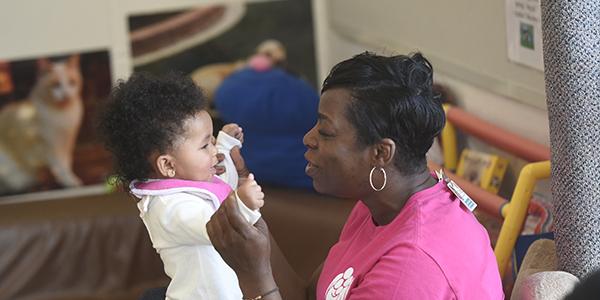Tell Families, “We See You and We Value Your Contribution"

With this blog, we are pleased to launch "Supporting Families and Teachers Through Change", a blog series where authors from many perspectives and roles in early childhood explore ways to support educators and the families they serve during this period of rapid change. In this blog, Dr. Brian Wright asks teachers to let families, especially Black and brown families, know that they are seen and their contributions to their children's learning are valued.
During these uncertain and extraordinary times, supporting families as they construct and reconstruct spaces of care and nurture for their children should include reminding them of their incredible resiliency, strength, and that their unique knowledge matters. By unique knowledge, I mean that families have always been their child’s first teacher. Within families of color, teaching and learning through the direct and indirect transmission of cultural knowledge has a long and storied history.
Within families of color, teaching and learning through the direct and indirect transmission of cultural knowledge has a long and storied history.
Prior to and during COVID-19, maintaining continuity of care and protection (food, shelter, clothing, and/or access to remote learning) has not been easy across race and socioeconomic strata. Families deserve praise for their efforts to provide a foundation of security to cultivate their child’s development of a healthy self-identity, voice, agency, and academic achievement. Understanding that developmental change and dimensions of growth in the ways children think, speak, and act are inevitable, families need ongoing support and encouragement to understand the importance of establishing consistency in daily routines.
Unfortunately, schools and society have not always done a good job of recognizing and honoring the sacrifices of all families, families of color, and especially Black and Latinx families. Often what these families teach their children in their homes and communities is viewed as irrelevant for school. This limited and narrow view of parenting/childrearing ignores the interactive and adaptive practices of Black and Brown families, as well as other families of color.
This limited and narrow view of parenting/childrearing ignores the interactive and adaptive practices of Black and Brown families, as well as other families of color.
Therefore, in these times of so much disruption, interruption, sickness, and loss, all families in general and families of color specifically, need reassurance that:
- They have always made a way out of “no way,” when it seemed like the way forward was unclear;They have always taught their children based on personal/cultural knowledge because they knew that school knowledge would only allow them to survive and not thrive;
- They are brilliant, beautiful, brave and a part of what Dr. Martin Luther King, Jr. described as the Beloved Community; AND
- We educators see your humanity and your light in the dark, and we honor your cultural knowledge of raising and teaching your children to the best of your ability
Brian L. Wright, PhD, is an associate professor and program coordinator of early childhood education in the Department of Instruction and Curriculum Leadership in the College of Education at the University of Memphis. He is also the coordinator of the middle school cohort of the African American Male Academy at the university. Dr. Wright is author of The Brilliance of Black Boys: Cultivating School Success in the Early Grades, with contributions by Shelly L. Counsell, which won the National Association for Multicultural Education's 2018 Phillip C. Chinn Book Award. [email protected]